- Home
- Natalia Ginzburg
Family Lexicon
Family Lexicon Read online
NATALIA GINZBURG (1916–1991) was born Natalia Levi in Palermo, Sicily, the daughter of a Jewish biologist father and a Catholic mother. She grew up in Turin, in a household that was a salon for antifascist activists, intellectuals, and artists, and published her first short stories at the age of eighteen; she would go on to become one of the most important and widely taught writers in Italy, taking up the themes of oppression, family, and social change. In 1938, she married Leone Ginzburg, a prominent Turinese writer, activist, and editor. In 1940, the fascist government exiled the Ginzburgs and their three children to a remote village in Abruzzo. After the fall of Mussolini, Leone fled to Rome, where he was arrested by Nazi authorities and tortured to death. Natalia married Gabriele Baldini, an English professor, in 1950, and spent the next three decades in Rome, London, and Turin, writing dozens of novels, plays, and essays. Lessico famigliare (Family Lexicon) won her the prestigious Strega Prize in 1963 and La famiglia Manzoni was awarded the 1984 Bagutta Prize. From 1983 to 1987, she served in the Italian parliament as an Independent (having left the Communist Party), where she dedicated herself to reformist causes, including food prices and Palestinian rights.
JENNY McPHEE is a translator and the author of the novels The Center of Things, No Ordinary Matter, and A Man of No Moon. She is the director of the Center of Applied Liberal Arts at New York University and lives in New York.
PEG BOYERS teaches poetry and translation at Skidmore College and at the Columbia University School of the Arts. She is the executive editor of Salmagundi Magazine and the author of three books of poetry published by the University of Chicago Press. One of those books, Hard Bread, is based on the life of Natalia Ginzburg.
FAMILY LEXICON
NATALIA GINZBURG
Translated from the Italian by
JENNY McPHEE
Afterword by
PEG BOYERS
NEW YORK REVIEW BOOKS
New York
THIS IS A NEW YORK REVIEW BOOK
PUBLISHED BY THE NEW YORK REVIEW OF BOOKS
435 Hudson Street, New York, NY 10014
www.nyrb.com
Copyright © 1963, 1999, 2010 by Giulio Einaudi Editore, s.p.a., Turin
Translation copyright © 2017 by Jenny McPhee
Afterword copyright © 2017 by Peg Boyers
All rights reserved.
Felice Casorati, Raja, 1925; © 2014 Artists Rights Society (ARS), New York/SIAE, Rome; private collection, Mondadori Portfolio/Electa/Sergio Anelli/Bridgeman Images
Cover design: Katy Homans
Originally published in Italian in 1963 as Lessico famigliare
by Giulio Einaudi Editore
Library of Congress Cataloging-in-Publication Data
Names: Ginzburg, Natalia, author. | McPhee, Jenny, translator. | Boyers, Peggy, 1952–writer of afterword.
Title: Family lexicon / by Natalia Ginzburg ; translated by Jenny McPhee ; introduction by Peg Boyers.
Other titles: Lessico famigliare. English
Description: New York : New York Review Books, 2017. | Series: New York Review Books classics
Identifiers: LCCN 2016026803 | ISBN 9781590178386 (paperback)
Subjects: LCSH: Ginzburg, Natalia—Fiction. | Authors, Italian—Fiction. | World War, 1939–1945—Italy—Fiction. | Domestic fiction. | BISAC: FICTION / Family Life. | FICTION / Historical. | FICTION / Political. | GSAFD: Autobiographical fiction.
Classification: LCC PQ4817.I5 L413 2017 | DDC 853/.912—dc23
LC record available at https://lccn.loc.gov/2016026803
ISBN 978-1-59017-839-3
v1.0
For a complete list of titles, visit www.nyrb.com or write to: Catalog Requests, NYRB, 435 Hudson Street, New York, NY 10014
CONTENTS
Biographical Notes
Title Page
Copyright and More Information
FAMILY LEXICON
Notes
Afterword
FAMILY LEXICON
AUTHOR’S PREFACE
THE PLACES, events, and people in this book are real. I haven’t invented a thing, and each time I found myself slipping into my long-held habits as a novelist and made something up, I was quickly compelled to destroy the invention.
The names are also real. In the writing of this book I felt such a profound intolerance for any fiction, I couldn’t bring myself to change the real names which seemed to me indissoluble from the real people. Perhaps someone will be unhappy to find themselves so, with his or her first and last name in a book. To this I have nothing to say.
I have written only what I remember. If read as a history, one will object to the infinite lacunae. Even though the story is real, I think one should read it as if it were a novel, and therefore not demand of it any more or less than a novel can offer.
There are also many things that I do remember but decided not to write about, among these much that concerned me directly.
I had little desire to talk about myself. This is not in fact my story but rather, even with gaps and lacunae, the story of my family. I must add that during my childhood and adolescence I always thought about writing a book about the people whom I lived with and who surrounded me at the time. This is, in part, that book, but only in part because memory is ephemeral, and because books based on reality are often only faint glimpses and fragments of what we have seen and heard.
AT THE dinner table in my father’s home when I was a girl if I, or one of my siblings, knocked a glass over on the tablecloth or dropped a knife, my father’s voice would thunder, “Watch your manners!”
If we used our bread to mop up pasta sauce, he yelled, “Don’t lick your plates. Don’t dribble! Don’t slobber!”
For my father dribble and slobber also described modern painting, which he couldn’t stand.
He would say, “You have no idea how to behave at the table! I can’t take you lot anywhere.”
And he said, “Any table d’hôte in England would quickly show you slobs the door.”
He had the greatest respect for England and believed that civility had found there, more than anywhere else in the world, its greatest expression.
At dinner he’d comment on the people he’d encountered during the day. He was very harsh in his judgments and thought everyone was stupid. For him someone stupid was a “nitwit.”
“He struck me as a real nitwit,” he would say about some new acquaintance.
In addition to the “nitwits,” there were also the “negroes.” For my father, a “negro” was someone who was awkward, clumsy, and faint-hearted; someone who dressed inappropriately, didn’t know how to hike in the mountains, and couldn’t speak foreign languages.
Any act or gesture of ours he deemed inappropriate was defined as a “negroism.”
“Don’t be negroes! Stop your negroisms!” he yelled at us continually.
The gamut of negroisms was wide. Wearing city shoes on a mountain hike was called a negroism, as was engaging in a conversation on a train with a fellow traveler or in the street with a passerby; or speaking to a neighbor from your window; taking off your shoes in the living room; warming your feet on the radiator; complaining on a mountain hike of thirst, fatigue, or blisters; bringing greasy cooked food on a hike along with napkins to wipe your fingers.
On our mountain hikes only certain foods were allowed: fontina cheese, jam, pears, hard-boiled eggs. And we were only allowed to drink tea prepared on a portable stove by our father. Frowning, he would lean his big head covered in short red hair over the stove while shielding the flame from the wind with the flaps of his rust-colored wool jacket, the pockets threadbare and singed. He always wore that same jacket whenever we were on holiday in the mountains.
•
Brandy and sugar lumps were, a
ccording to him, “negro stuff” and therefore forbidden on our hikes; and we were never allowed to stop for a snack in the mountain chalets as this was considered a negroism. Protecting your head from the sun by wearing a kerchief or a straw hat, or from the rain with a waterproof cap, or tying a scarf around your neck were also deemed negroisms. Such preventive wear was, instead, precious to my mother, and the morning before we left on our hike she would try to slip these things into a rucksack for both our use and her own. If my father laid his hands on any of them, he would angrily throw it out.
While on hikes, wearing our large, rigid, lead-heavy hobnailed boots, thick woolen socks, balaclava helmets, and snow goggles across our foreheads with the sun beating squarely down on our sweating heads, we would stare with envy at the “negroes” who strode easily by in tennis shoes or lounged at the chalet tables eating cream.
My mother called mountain hiking “the devil’s idea of fun for his children,” and she always tried to stay home, above all when the outing included a meal, since after eating she loved to read the paper and then take a nap on a sofa indoors.
We went to the mountains every summer. We rented a house for three months, from July through September. The houses were usually far from town in some remote location. Every day, our rucksacks on our backs, my father, my siblings, and I went to do the shopping in the village. There were no amusements or distractions of any kind. We children and my mother spent the evenings in the house sitting around a table. My father retreated to a distant part of the house to read, every so often sticking his head into the room where the rest of us were talking and playing together. Frowning and suspicious, he complained to my mother about our servant Natalina who had disturbed certain books of his. “Your darling Natalina, that half-wit,” he would say, careless of the fact that from the kitchen Natalina could hear his every word. She was, however, accustomed to hearing herself called “that half-wit Natalina” by him and took not the slightest offense.
On some evenings during our mountain holiday my father would prepare for the next day’s hike or climb. Kneeling on the ground, he greased his and my siblings’ boots with whale fat; he believed that he alone knew how to grease the boots properly with the fat. A great clashing of metals would then be heard throughout the apartment as he looked for crampons, pitons, and ice axes.
“Where have you hidden my ice ax?” he roared. “Lidia! Lidia! Where have you lot hidden my ice ax?”
He would set off for a mountain climb at four o’clock in the morning, sometimes alone, sometimes with an Alpine guide who was also a friend, sometimes with my siblings. He’d be so worn out the day following these climbs he’d become unbearable. He’d read the paper silently, his face red and swollen, having been burnt by the sun reflecting off glaciers, his lips chapped and bleeding, his nose covered in a yellow cream that looked like butter, his brow furrowed and stormy. Any trifle would send him flying into a terrifying rage. Whenever he returned from these climbs with my siblings, my father announced that his children were “numskulls” and “negroes,” and that none of his children had inherited his passion for the mountains—with the exception of Gino. Gino was the eldest and a great climber. Along with a friend he’d completed highly difficult ascents. When my father spoke about Gino and his friend, he did so with a mixture of pride and envy, declaring that he no longer possessed their stamina now that he was getting old.
My brother Gino was, in any case, his favorite and he was gratified by him in every way. Gino was interested in natural history; collected insects, crystals, and other minerals; and was very studious. Gino later enrolled in engineering school and when he came home after an exam reporting that he had received an A, my father would ask, “What do you mean you got an A? Why didn’t you get an A-plus?”
And if he did get an A-plus, my father would say, “Oh, it must have been an easy exam.”
In the mountains, when he wasn’t on a climb or hike that lasted until the evening, my father would go “walking” every day. He left early in the morning, dressed exactly as he would have been for a climb but without ropes, crampons, or his ice ax. He often went walking alone, because we and my mother were, in his words, “loafers, dolts, and negroes.” He set off with his hands clasped behind his back, his tread heavy due to his hobnailed boots, his pipe between his teeth. Sometimes he made my mother go with him. “Lidia! Lidia!” he thundered in the morning, “Let’s go walking! If you don’t, you’ll grow lazy always lounging about in the meadows.” My obedient mother, her walking stick in hand, her sweater tied around her waist, followed a few paces behind him, shaking her head of curly gray hair that she wore very short, even though my father objected vehemently to the current fashion for short hair—so much so, that on the day she’d had it cut, he’d flown into a rage violent enough to bring down the house.
“You’ve cut your hair again! What a jackass you are!” my father told her every time she came home from the hairdresser. “Jackass” in my father’s lexicon didn’t mean someone who was ignorant but someone who was rude or ill-mannered. We children were “jackasses” when we were either uncommunicative or talked back.
“Frances put you up to it!” my father said to my mother when he saw she’d cut her hair again. Frances, a friend of my mother’s and the wife of a childhood classmate of my father’s, was in fact much loved and respected by my father. In his eyes her only flaw was having introduced my mother to the short hairstyle. Frances had relatives in Paris, whom she visited often, and one winter arrived home declaring, “In Paris, short hair is in fashion. In Paris, everyone has the sporty look.” All winter long, my sister and mother kept repeating, “In Paris, the sporty look is all the rage,” trying to sound like Frances who spoke with the soft r. They shortened the hems on all their dresses, and my mother cut her hair. My sister didn’t cut hers because her hair was beautiful and blond and fell down the entire length of her back—and she was too afraid of my father.
•
My grandmother—my father’s mother—usually joined us on those mountain holidays. She didn’t stay with us but at a hotel in the village.
When we went to visit her we often found her sitting on the hotel terrace under a sun umbrella. She was small and on her minuscule feet wore black ankle boots with tiny buttons. She was proud of her small feet, which poked out from under her skirt, and she was proud of her crimped, snow-white hair combed up into a bouffant. Every day my father took her for a “stroll.” They went along the main roads because she was old and couldn’t manage the trails, especially in her ankle boots with those little heels. He walked ahead, his strides long, his hands behind his back, his pipe in his mouth, while she followed, her dress swishing as she took tiny steps in her tiny heels. She never wanted to take the same road as the day before, always desiring new ones.
“This is the same road we took yesterday,” she complained.
Without turning around, my father responded perfunctorily, “No, it’s a different one.”
But she continued to repeat, “It’s the same road as yesterday. It’s the same one.”
After a while she said, “I have a cough that’s choking me to death,” but my father pushed on ahead without looking back. “I have a cough that’s choking me to death,” she repeated, raising her hands to her throat.
She always repeated the same thing two or three times. She said, “That scoundrel Fantecchi insisted on making me a brown dress! I wanted a blue one! I wanted a blue one!” And she angrily struck her umbrella against the pavement. My father told her to watch the sunset over the mountains, but having been seized by an attack of rage at her tailor Fantecchi, she furiously continued to jab the tip of her umbrella into the ground. She came to the mountains only in order to be with us. The rest of the year she lived in Florence and we lived in Turin so we only ever saw each other in the summers. But she couldn’t stand the mountains and her dream would have been to go on holiday to the spa towns of Fiuggi or Salsomaggiore, places where she’d spent her summers when she was young.
/> My grandmother was once very rich but had been impoverished by the Great War. Convinced Italy wouldn’t win, and nurturing a blind faith in Franz Joseph, she had insisted on keeping her Austrian investments and so had lost a great deal of money. My father, an irredentist, had tried in vain to convince her to divest of her Austrian interests. My grandmother referred to her money loss as “my misfortune,” and in the mornings she despaired over it while pacing up and down in her room and wringing her hands. But she wasn’t all that poor. In Florence, she had a beautiful home with Turkish carpets and furniture from China and India because one of her grandfathers—he was called Parente—had been a collector of precious objects. Portraits of her various ancestors hung on the walls, including those of her grandfather Parente and of La Vendée, an aunt who was so called because of her reactionary politics and the fact that she had held a salon for diehards and counterrevolutionaries. There were many more portraits of aunts and cousins called Margherita or Regina, names once common in Jewish families. Among the portraits, however, my grandmother’s father was not to be found, and he wasn’t to be mentioned either. He was a widower, and after quarreling one day with his two daughters, by then adults, he declared that to spite them he would marry the first woman he met on the street, and he’d done just that. Or, at any rate, that was the family story. Whether or not he did actually marry the very first woman he encountered after walking out his front door, I don’t know. In any case, with his new wife he had another daughter whom my grandmother wanted nothing to do with, and whom she referred to with disgust as “Daddy’s doll-baby.” Occasionally, we would run into “Daddy’s doll-baby”—by now a mature and distinguished woman of fifty—while we were on holiday in the mountains, and my father would turn to my mother and say, “Did you see that? Did you see? There went ‘Daddy’s doll-baby’!”

 Happiness, as Such
Happiness, as Such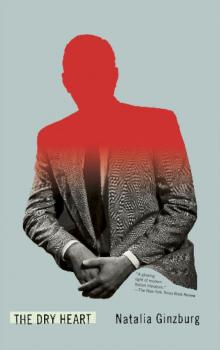 The Dry Heart
The Dry Heart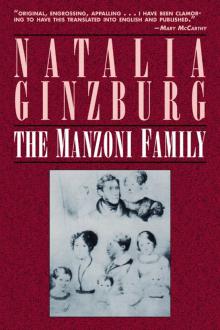 The Manzoni Family
The Manzoni Family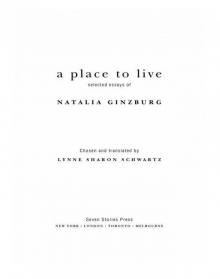 A Place to Live
A Place to Live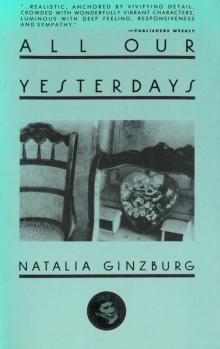 All Our Yesterdays
All Our Yesterdays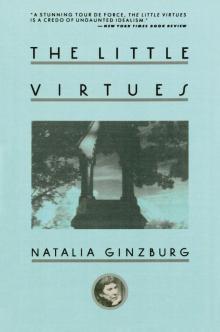 The Little Virtues
The Little Virtues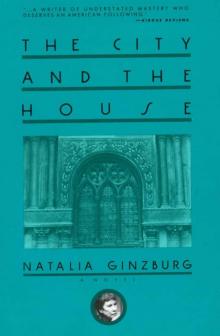 The City and the House
The City and the House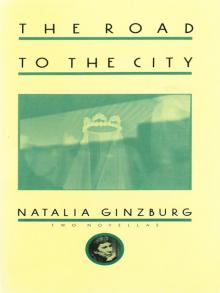 The Road To The City
The Road To The City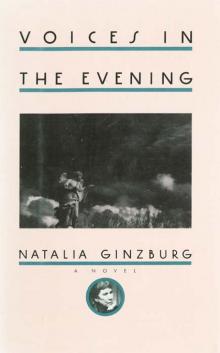 Voices In The Evening
Voices In The Evening